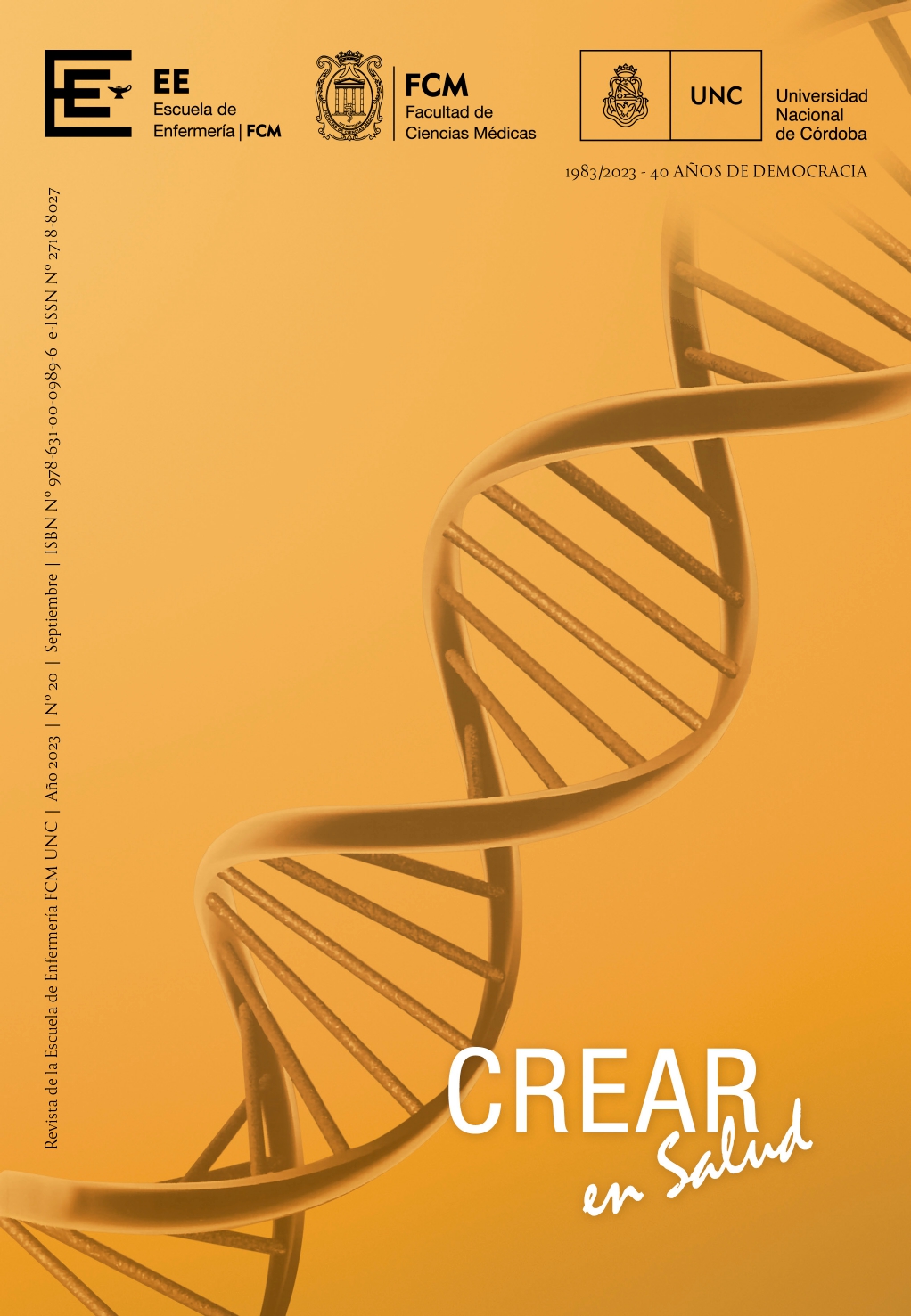PARENTS’ EXPERIENCES IN SUPPORT THROUGH THE KANGAROO MOTHER METHOD
Keywords:
Prematuro – Método madre canguro - VínculoAbstract
Introduction: Partial report of the research project “Parents’ experiences in the support of the kangaroo mother method”. The increase in premature births, their neurodevelopment and also the quality of life through the use of the kangaroo mother method has increased and presents a challenge today. This is a skin-to-skin care model, with the aim of replacing
incubators in developing countries, since it is an economical method and does not require sophisticated equipment. Objective: to explore the experiences of parents in the practice of kangaroo mother care in premature babies in the Intermediate Care Units of Private Clinics in the city of Córdoba. Methodology: qualitative study with a phenomenological approach that
analyzed the experiences of the parents during the application of the Kangaroo Mother Method, semi-structured interviews were used until data saturation with 4 mothers of different ages.
Result: two categories were obtained from the narratives, the first “Feelings and emotions in the practice of the kangaroo mother method” with happiness and fear as subcategories; and as a second category “Link in the practice of the kangaroo mother method” with attachment and
benefits as subcategories. Discussion and conclusion: based on the lines selected as technical support and taking into account the results obtained and presented, it is possible to point out that there is progress in the kangaroo mother method and its application, as well as the importance
in the neurodevelopment of premature babies. Although it is vitally important to highlight that there is an absence of knowledge regarding the feelings and emotions that parents go through
when carrying out the practice, leaving the kangaroo mother method simply as a technical procedure to be performed and not giving importance to the psycho-emotional benefit that it provides. provides its application.
References
Aguilar Guzmán, O. Carrasco González, M. García Piña, M. Saldivar Flores, A.
Ostiguín Meléndez, R. (2007). Madeleine Leininger: un análisis de sus fundamentos teóricos. Revista Enfermería Universitaria, 4 (2), 26-30.
https://www.redalyc.org/pdf/3587/358741822005.pdf
Bergman, N. (2005). El modo canguro de tener él Bebe. Sextas Jornadas Internacionales sobre Lactancia. Paris. https://www.quenoosseparen.info/articulos/documentacion/documentos/elmetodocangurodetenerelbebe_nils_bergman.pdf
Bowlby, J. Organización Mundial de la Salud (1954). Los cuidados maternos y la salud mental. https://www.google.com/searchsca_esv=563750832&rlz=1C1GCEA_enAR1025AR1025&q=Bowlby,+J.+y+Organizaci%C3%B3n+Mundial+de+la+Salud+(En.)+(1951).+Maternal+care+and+mental+health.+Editorial,+%E2%80%8EWorld+Health+Organization.&spell=1&sa=X&ved=2ahUKEwjs2pmxzpuBAxVwppUCHdWkBlEQBSgAegQICBAB&biw=1366&bih=661&dpr=1
Campiglia Calveiro, M (2017). La institucionalización del nacimiento. Vinculo roto. [Tesis doctoral en Antropología. Universidad de México].
Cuesta Moreno, O (2019). La construcción de la felicidad como objeto de estudio y su posible abordaje desde el campo de la comunicación.
Revista La luciérnaga comunicación, 11 (21). https://revistas.elpoli.edu.co/index.php/luc/article/view/Art.7
Chiavenato, I (2002). Administración de recursos humanos. https://www.sijufor.org/uploads/1/2/0/5/120589378/administracion_de_recursos_humanos_-_chiavenato.pdf
García Andrade, A (2019). Neurociencia de las emociones: la sociedad vista desde el individuo. Una aproximación a la vinculación sociología-neurociencia. Revista Sociología, 34 (96), 39-71. https://www.scielo.org.mx/pdf/soc/v34n96/2007-8358-soc-34-96-39.pdf
Hernández, A. (2020). ¿Cuál es la diferencia entre emoción y sentimiento? El diván de Alejandra, nuestro blog de psicología. https://www.hernandezpsicologos.es/blog/diferenciaemocionsentimiento/#:~:text=Las%20emociones%20son%20reacciones%20psicofisiol%C3%B3gicas,emociones%20tienen%20una%20intensidad%20mayor
Lebovici, S (1985) La psicopatología del bebé. https://espaciopsicopatologico.files.wordpress.com/2017/02/la-psicopatologicc81a-delbebecc81-serge-lebovici-y-franccca7oise-weil-halpern.pdf
Lucchini Raies, C. Márquez Doren, F. Uribe Torres, C. (2012). Efectos del contacto piel con piel del recién nacido con su madre. Revista Index
Enfermería, 21 (4). https://scielo.isciii.es/scielo.php?script=sci_arttext&pid=S1132-12962012000300007
Ministerio de Salud y Protección Social. Programa Mundial de Alimentos de las Naciones Unidas. (2010). Método Madre Canguro. Kit Pedagógico y sitio web de formación para la implementación, fortalecimiento y actualización de los programas madre canguro en Colombia. http://fundacioncanguro.co/PFMMC/es/docs/mmc/2.%20LA%20POSICI%C3%93N%20CANGURO.pdf
Ministerio de Protección Social y Programa Mundial de Alimentos (2017). Actualización de los Lineamientos Técnicos para la implementación de
Programas Madre Canguro en Colombia, con énfasis en la nutrición del neonato prematuro o de bajo peso al nacer
Navarro, B. (2007). La urgencia de la educación emocional. Revista Electrónica de Investigación Educativa, 9 (2).
https://www.redalyc.org/pdf/155/15590213.pdf
Organización de las Naciones Unidas (1990). Objetivos de Desarrollo del Milenio.
https://www.cepal.org/es/temas/objetivos-de-desarrollo-del-milenio-odm/objetivos-desarrollo-milenio
Organización Mundial de la Salud. Organización Panamericana de la Salud (2014) Guía para el manejo integral del recién nacido grave.
https://iris.paho.org/bitstream/handle/10665.2/52805/978598171_spa.pdf?sequence=5&isAllowed=y
Organización Mundial de la Salud. OMS (2022). Nuevas recomendaciones para mejorar la atención a los bebés prematuros y de bajo peso al nacer.
Pedicino, H (2016). Una propuesta para clasificar la felicidad como una enfermedad psiquiátrica. Revista Pediátrica, 114 (6), 502-507
https://www.sap.org.ar/docs/publicaciones/archivosarg/2016/v114n6a04.pdf
Pichón-Rivière, E. (1985). Teoría del vínculo. Ediciones Nueva Visión.
https://proletarios.org/books/Riviere-Teoria_del_vinculo.pdf
Siesquén Vértiz, E. (2016). Vivencias de ser papa canguro. [Tesis Especialidad en Cuidados intensivos neonatales. Universidad Nacional de Trujillo].
http://dspace.unitru.edu.pe/bitstream/handle/UNITRU/14432/2E%20440.pdf?sequence=1&isAllowed=y
Testoni, T. dos Passos Aires, L (2018). El método Canguro como un vehículo para el empoderamiento materno. Revista Família, Ciclos de Vida e Saúde no Contexto Social, 2, 611-619. https://www.redalyc.org/journal/4979/497956940010/497956940010_1.
Downloads
Published
Issue
Section
License
Copyright (c) 2023 Crear en Salud

This work is licensed under a Creative Commons Attribution-NonCommercial 4.0 International License.



